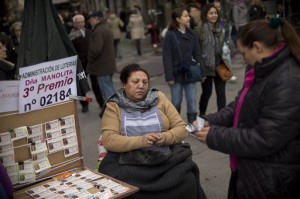
A woman buy tickets for the cash-strapped country’s famed Christmas lottery, in Madrid, Friday, Dec. 21, 2012. Many players say they’re hoping to win so they can pay off debt or help relatives facing heavy economic burdens. Known as “El Gordo” (The Fat One) and billed as the world’s richest lottery, the drawing will hand out about 2.5 billion of euro ($3.3 billion) on Saturday. The top prize is about 400,000 euro ($530,000) but there are expected to be hundreds or thousands of tickets awarded for that amount. (AP Photo/Daniel Ochoa de Olza)
MADRID — After another brutal year of economic hardship, Spaniards across the country are hoping for relief when the country’s famed Christmas lottery — the world’s richest — pays out €2.5 billion ($3.3 billion) in tax-free awards on Saturday.
Almost everyone in the country of 46 million people will be glued to live TV to watch school children sing out the winning numbers for the lottery that pays out maximum prizes of €400,000 ($529,840) and many more for smaller amounts. The top prize is dubbed “El Gordo” (“The Fat One”) and is likely to be won by hundreds if not thousands of players.
Unlike other big lotteries that generate just a few big winners, Spain’s lottery — now in its 200th year — has always aimed for a share-the-wealth-system rather than a single jackpot, and thousands of numbers yield at least some kind of return.
The Christmas lottery is so popular that there are frequently three €20 euro tickets sold for every Spaniard, and the lottery itself is the unofficial kickoff of the holiday season.
“A lot of people win,” said Pablo Foncillas, a marketing professor at the IESE Business School in Madrid. “It’s really common even if you don’t win to get a free ticket. So many people win that people just keep on playing. Everyone knows someone who’s won, even if it’s only a little bit.”
Hundreds of players lined up daily to buy tickets this week outside the Dona Manuelita lottery store in Madrid that has often sold winning tickets. Before Spain’s property-led economic boom collapsed in 2008, they had hoped to win so they could buy a small apartment or a car. Now they said they need the money just to hang on to what they have and avoid being evicted or having cars repossessed.
Betting that tickets from Dona Manuelita stood a better chance of winning, unemployed construction company office manager Miguel Angel Ruiz drove 165 kilometers (102 miles) to buy for a pool of players including his wife and relatives.
“We’re buying more hoping we’ll hit it so we can emerge from poverty,” said Ruiz, 39. “Before the crisis, lottery winnings were to buy an apartment or a car, and now it’s to pay debts.”
Diego Sanbrano, let go from his waiter’s job two months ago, said the Spanish lottery isn’t about getting rich and never working again.
“It’s to pay off debts and straighten out your life,” he said. “You pay the mortgage and make the car payment, and then maybe you have a little left over to go somewhere on vacation.”
Since so many people chip in to buy tickets in groups, the top prizes frequently end up being handed out in the same small town or in one city neighborhood. Last year’s top winning number hit for 1,800 tickets in the northern town of Granen, population 2,000. Townspeople shared about €700 million, and the rest of the €1.8 billion was doled out in smaller prizes around Spain.
The Dec. 22 lottery began in 1812 and last year sold an estimated €2.7 billion in tickets with per-capita spending of about €70 just for the Christmas lottery.
Spain holds another big lottery Jan. 6 to mark the Feast of the Epiphany. It is known as “El Nino” (The Child), in reference to the baby Jesus.
But the crisis will hit El Nino and all lotteries going forward. Until now, lottery winnings have been free from taxation. Waves of austerity measures imposed by the government this year to prevent Spain from asking for public finances bailout like those for Greece, Ireland and Portugal have translated into higher taxes. Lottery winnings above €2,000 will face a 20 percent tax in 2013.